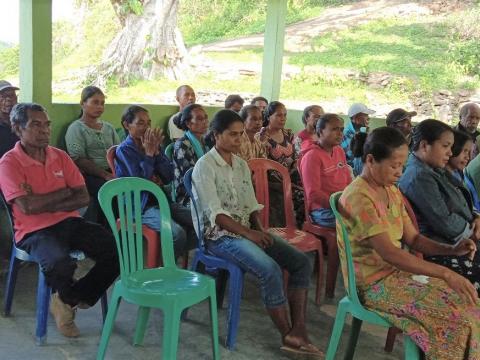Gender equality brings change to Mery’s family

Attending a Disaster READY project training session, Mery wears traditional clothes called ‘Tia Lipa’, as following ancestral beliefs, women who are married change from wearing modern to traditional clothes. Her long hair is tied up, as she sits in the front row listening to World Vision’s Januario lead the group training. “During the training, Mery doesn’t ask questions, but she always sits at the front,” said Januario. Mery was one of the 34 people (18 women, 15 men, 1 woman with a disability) who attended the two-day training session.
Through the project, World Vision is providing training on gender, child protection and disability inclusion in disaster risk reduction so that people like Mery know how to reduce the risk of disasters in their community. The training discusses traditional gender roles, and the importance of ensuring the equal participation of men, women, people with a disability, youth and the elderly, as well as child protection, in family and community life, including disaster preparedness and response, and climate change adaptation.
Mery said she sees things differently now: how to protect her daughter in the event of a disaster and supporting her to spend time studying or playing, as well as sharing roles and responsibilities with her husband. “When it’s windy, I have to take care that my daughter does not play close to the trees that can endanger her life. In terms of gender equality, in case landslides or earthquakes occur, as a wife I have to support my husband to protect our house by planting trees.”
Adelaide said she has seen a change in her mother. “When it’s windy, my mum always lets me know not to go play outside because what I have seen here, the wind always takes out people’s houses, and rooftops and trees fall everywhere,” she said. “I usually help my mother clean dishes, cook and clean the house. But mum doesn’t force me, I can work whenever I want. I spend more of my time studying and playing with friends. Before, I only had a few times to study because I had to help my mother do household work. If I didn’t do that, my parents would be mad at me. But now, I can see my mum is changing, she is more protective and caring towards me.”
“I appreciate what my wife has done so far, she is wiser than before,” said Quintino. “I realised that sometimes we argue with each other because she feels tired and hasn’t got any help from me. But things have changed. I support her doing household work, such as cooking, washing clothes and fetching water, and I help my daughter with her homework. Sometimes I go to the farm by myself because my wife has a lot of work to do at home and needs to spend more time with my child. My daughter is special to me because she is my only daughter, and I always do as best as I can for her. Sometimes I am mad at her because she doesn’t want to help her mother in the kitchen, but I never hit or force her. I always keep reminding her of what she should do, and she understands that we want what is best for her future.”
Through this training Mery and her community are better prepared for and able to manage and respond to rapid and slow-onset disasters, ensuring gender equality, disability inclusion and child protection so that the most vulnerable community members are included. The training has been conducted in 26 aldeia in eight suco in Bobonaro municipality, benefitting 325 women, 459 men, 4 women and 2 men with disabilities, and 48 girls and 68 boys.
The Disaster READY project is supported by the Australian Government through the Australian Humanitarian Partnership.